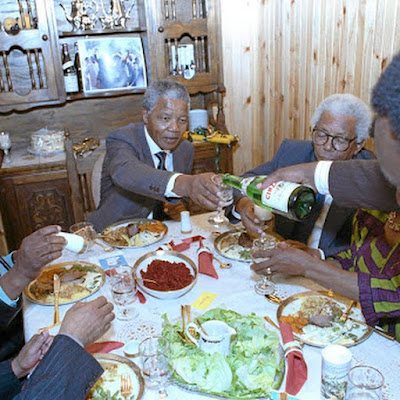Mandela's Dining Table in A Restaurant: A Tale of Forgiveness
Mandela's Dining Table in A Restaurant: A Tale of Forgiveness
In the heart of South Africa, Nelson Mandela emerged not merely as a leader but as an enduring symbol of resilience, forgiveness, and boundless hope during the latter half of the 20th century. His journey was a relentless struggle against the chains of apartheid—a nefarious system of institutionalized racial segregation and discrimination. Mandela, with his indomitable spirit and determination, became a beacon of hope in the face of injustice and fought against inequality and oppression, enduring more than two decades of imprisonment for his noble ideals.
Despite the hardships he faced, Mandela never lost sight of his vision for a united South Africa, where all people, regardless of their race or background, could live together in harmony. His visionary leadership and steadfast commitment to reconciliation eventually led to his release from prison and his historic election as the first black president of South Africa in 1994.
After spending more than two decades behind bars, Mandela's inauguration as president marked a new era for South Africa. Accompanied by his security team, Mandela used to venture into town, embracing the newfound freedom and the responsibilities that came with his position.
On one such occasion, while being on a tour of the city, Mandela decided to dine at a local restaurant. Inside the restaurant, he noticed a man anxiously awaiting his meal. Moved by compassion, Mandela instructed his security officers to invite the man to join them and have meal together. Though initially hesitant, the man accepted the offer. As they shared a meal, Mandela and his security team observed that while eating, the man appeared uneasy and his hands trembled noticeably. Once he finished, he left without saying much.
Observing the man's condition, Mandela's security officers remarked, "his condition was not well and he seemed unwell as his hands were shaking." Mandela, however, perceived the deeper truth behind the man's shaky condition and informed them saying that "No, he was not sick, rather he was frightened, perhaps expecting me I'd treat him as he used to treat me."
With a heavy heart, Mandela revealed a painful chapter from his past. “This man,” he began, “had been a guard at the prison where I had been held for decades and subjected to brutal treatment. Often, after the torture, I used to scream and ask for a little water. Then, the very same man used to come every time to me and when he found me fainted unconsciously due to barbaric beatings, he used to urinate on my head instead. The man's trembling hands were not a sign of physical sickness or weakness but a manifestation of fear and guilt, apprehending retribution from the very man he had tormented, who now stood as President of the country and might seek revenge for his past misdeeds." Yet, despite the torment he had endured, Mandela harboured no bitterness. He continued, "Revenge is a destructive passion. It hinders nation-building. Patience and mercy, on the other hand, nurture unity and progress."
Mandela's response stood as a testament to his extraordinary character and wisdom. His emphasis on forgiveness underscored the notion that revenge is a trait unbefitting a visionary statesman like Mandela, whereas patience and mercy are virtues that a leader should always uphold, as they are indispensable for nation-building and integration. Mandela’s act exemplified that forgiveness is not a sign of weakness but a powerful demonstration of strength and resilience.
At the end of the story, As the encounter concluded, Mandela imparted a pearl of timeless wisdom to those around him: "People of weak character are slow to forgive, while people of strong character are quick to forgive and don't hesitate." His words still resonate as a reminder of the power of forgiveness and the transformative impact it can have on individuals and nations alike.
Nelson Mandela's legacy continues to inspire people around the world, reminding us of the paramount importance of unity, reconciliation, and the relentless pursuit of justice. His life serves as a beacon of hope, encouraging us to strive for a better future and to embrace the values of forgiveness and compassion in our daily lives.
The essence of the story underscores that a mindset driven by revenge can dismantle societies, whereas a spirit of tolerance and understanding can construct nations. Furthermore, it reminds us of the importance of treating others with kindness, as the future is uncertain for everyone.




Comments
Post a Comment